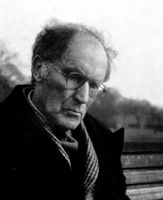Waley, A.
| English Phonetics | Arthur Waley |
|---|---|
| Sort Name | Waley, Arthur |
| Birth: | 1889/08/19 |
|---|---|
| Death: | 1966/06/27 |
| Place of birth: | Tunbridge Wells, Kent, England |
Tibetan calendar dates
Biographical Information
Arthur David Waley (born Arthur David Schloss, 19 August 1889 – 27 June 1966) was an English orientalist and sinologist who achieved both popular and scholarly acclaim for his translations of Chinese and Japanese poetry. Among his honours were the CBE in 1952, the Queen's Gold Medal for Poetry in 1953, and he was invested as a Companion of Honour in 1956.
Although highly learned, Waley avoided academic posts and most often wrote for a general audience. He chose not to be a specialist but to translate a wide and personal range of classical literature. Starting in the 1910s and continuing steadily almost until his death in 1966, these translations started with poetry, such as A Hundred and Seventy Chinese Poems (1918) and Japanese Poetry: The Uta (1919), then an equally wide range of novels, such as The Tale of Genji (1925–26), an 11th-century Japanese work, and Monkey, from 16th-century China. Waley also presented and translated Chinese philosophy, wrote biographies of literary figures, and maintained a lifelong interest in both Asian and Western paintings.
A recent evaluation called Waley "the great transmitter of the high literary cultures of China and Japan to the English-reading general public; the ambassador from East to West in the first half of the 20th century", and went on to say that he was "self-taught, but reached remarkable levels of fluency, even erudition, in both languages. It was a unique achievement, possible (as he himself later noted) only in that time, and unlikely to be repeated. (Source Accessed Apr 22, 2020)
- Wiki Pages
- Person description or short bio
Expand to see this person's philosophical positions on Buddha-nature.
| Is Buddha-nature considered definitive or provisional? | |
|---|---|
| Position: | |
| Notes: | |
| All beings have Buddha-nature | |
| Position: | |
| If "Qualified", explain: | |
| Notes: | |
| Which Wheel Turning | |
| Position: | |
| Notes: | |
| Yogācāra vs Madhyamaka | |
| Position: | |
| Notes: | |
| Zhentong vs Rangtong | |
| Position: | |
| Notes: | |
| Promotes how many vehicles? | |
| Position: | |
| Notes: | |
| Analytic vs Meditative Tradition | |
| Position: | |
| Notes: | |
| What is Buddha-nature? | |
| Position: | |
| Notes: | |
| Svātantrika (རང་རྒྱུད་) vs Prāsaṅgika (ཐལ་འགྱུར་པ་) | |
| Position: | |
| Notes: | |
| Causal nature of the vajrapāda | |
| Position: | |
